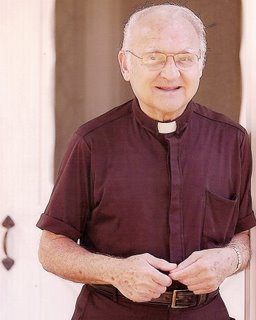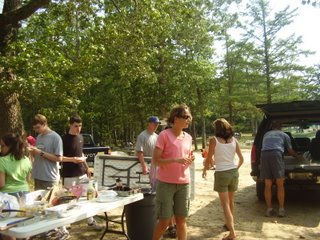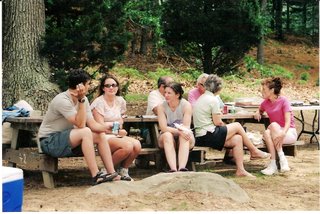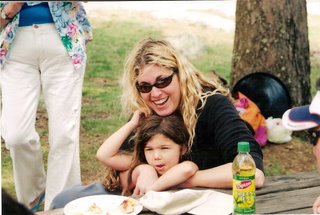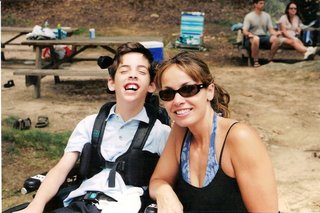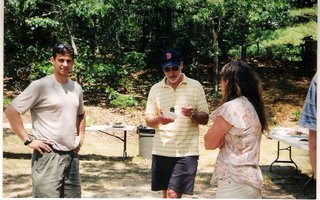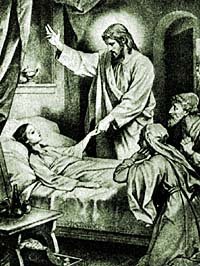
(Seventeenth Sunday of the Year (B): This homily was given on
We just heard
But here’s another version of the very same story. Believe it or not, this is the way some people think it should have happened:
“When Jesus raised his eyes and saw that a large crowd was coming to him, he said to Philip, ‘Where can we buy enough food for them to eat?’ He said this to test him, because he himself knew what he was going to do. Philip answered him, ‘Two hundred days’ wages worth of food would not be enough for each of them to have a little.’ Jesus said, ‘My goodness!” Then he took his magic wand out from under his flowing white robe, and he waved it in the air three times. Immediately the sky opened up, and several thousand little angels came down from heaven with beautiful wicker baskets in their hands. Each basket contained a dozen freshly baked rolls and the best tasting fish in the universe! Not surprisingly, every one of the baskets had a ‘heavenly’ aroma. The angels descended to those who were seated on the mountain and served them a glorious meal of bread and fish. Each person present had his own angelic server. When they had finished their mission, and all the people were as full as they could possibly be, the little angels flew back to heaven with 12 baskets of food left over, as Jesus waved his magic wand three more times.”
If there were such a thing as “The Gospel according to Harry Potter,” that would be the type of story you’d find in it, because the story portrays Jesus as a kind of “divine magician”.
But Jesus was NOT a divine magician!
During his earthly life, Jesus was a divine person who typically did powerful things with the involvement and the cooperation of human beings—like you and me!
That was his normal “MO”.
Notice that in this magical version of the miracle of the loaves and fish, Jesus acts alone. He does what he does on his own; he simply waves his magic wand, and bread and fish drop down from heaven for the people on the mountainside to eat.
In the real version of the story, however, Jesus does not act alone! Yes, he performs a great miracle and feeds thousands of people—but only after a little boy offers him the five loaves and the two fish that he has in his possession!
This begs the question: “What if?”—What if this young man hadn’t made his offering? What if he had held back? What if he had acted selfishly and kept the five barley loaves and the two fish for himself?
Could Jesus have performed the miracle without him?
Of course.
But I’m not so sure he would have.
Recall that Jesus did not work the miracles he wanted to work in his own hometown of
Obviously there’s an application here to good, charitable causes—like the building of an addition on a parish school! We can pray all we want, a great work like that doesn’t happen and doesn’t get paid for unless we are willing to give our “five loaves and two fish,” so to speak.
Just like the little boy in this story, God expects us to take action and to donate according to our means.
But it goes far beyond finances.
For example, if we really love Jesus Christ—if we have a living, personal relationship with him that’s rooted in the Church and the sacraments, then we will want our relatives and friends to have the very same type of relationship. That is to say, we will want them to “get converted”—and to stay converted throughout their lives. And we will pray every day for that to happen.
But that’s not sufficient! That’s not enough! If all we do is pray, then we’re expecting almighty God to act like a magician and “zap” these people with lightening bolts from heaven to get them to change.
Every once in awhile, of course, God does act in that kind of sovereign manner. He certainly did with
But most of the time, the Lord works to convert men and women gradually and indirectly—through people like you and me. So prayer is essential, since no conversion happens without the grace of God. But the Lord also expects us to offer our personal “five loaves and two fish” to those who need conversion: by giving them good example, and also by verbally sharing the Gospel message with them when appropriate.
Please hear this!—those of you who went to the
If you do (and I hope you do!), then pray for their conversions! Pray for that intention every day.
But make sure you don’t leave it at that! If you really want your friends to come to Christ in a radical and decisive way, then you need to take action. God expects you—and needs you—to do certain things. He needs you first of all, to be consistent in your personal witness. In other words, you can’t act like a good Catholic at Sunday Mass and then act like a pagan for the rest of the week. If you do, your unconverted friends won’t take you seriously—and neither will anyone else. They’ll simply call you a hypocrite and laugh.
But you also need to be willing to express your faith verbally—and respectfully—to them when it’s appropriate.
And please don’t tell me you can’t do this, because I know you can! We all can, regardless of our age. And we all should!
The devil, incidentally, wants us all to keep quiet about Jesus! He wants us to be intimidated and to say nothing about the Lord. He wants us, in other words, to refuse to offer our ‘loaves and fish’—so that Jesus won’t be able to work his miracle of conversion in the lives of those around us.
Thankfully, there are some people who are willing to speak. There are even teens in
We’d begin by having two or three of our teenagers talk to the group. They’d stand up in front of their peers and speak very candidly and very courageously about their lives and about their faith. And the assembled teens would almost always listen, because these were people their age who were speaking. (It wasn’t some old guy like me!)
Then came the heart of the program. About a dozen of them would put on a very brief but very powerful skit. It was about the temptations teenagers face (alcohol, drugs, sex and the like) and how Christ forgives us and sets us free.
When it was over, you could usually hear a pin drop in the room. Sometimes there were even tears. It really ‘hit home,’ so to speak, because the young people in the audience easily made the connection between what they saw in the skit and the circumstances of their own lives. (That’s what made it so effective!)
After this our teens would lead small group discussions about the message of the witness talks and the skit. Then we’d end with a short prayer service.
I mention this today because those young people 10 years ago did what the little boy in today’s Gospel did: they offered Jesus Christ their ‘loaves and fish’—their time, their talent, their example, and their words. And Jesus did something great with their offering: he touched the lives of other teenagers through them.
Jesus wants ‘loaves and fish’ from all his followers, including you and me—so that he can do great things among us, and bring many people to repentance and conversion.
Will we give him ours?
